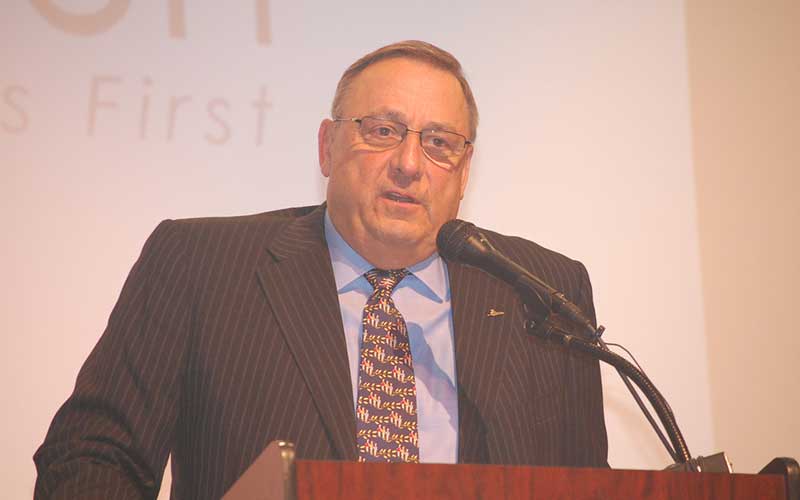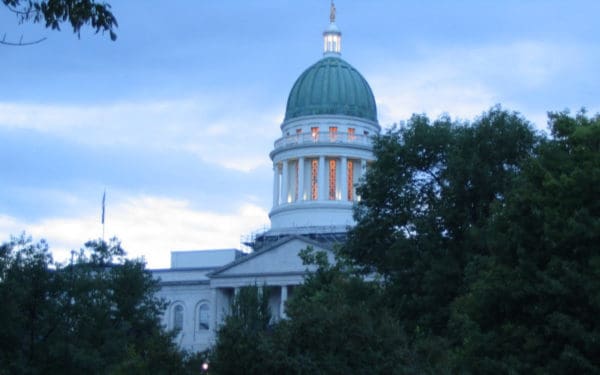
Maine's experience under Governor Paul LePage offers lessons for how to deal with a regressive Trump administration in Washington. Photo: MaineDOE
As the country girds itself for the incoming Trump administration, we can draw lessons from the experience of Mainers under Governor Paul LePage, who remarked that, before Trump was Trump, LePage was LePage.
The parallels to the Trump administration are notable. Like President-elect Trump, Governor LePage did not receive a majority of votes when he was elected in 2010, but he still took his win to be a mandate from the people. He came into office with Republican majorities in both the Maine House of Representatives and the Senate. And his cabinet appointees were problematic from the outset (Daryl Brown, LePage’s nominee to head the Maine Department of Environmental Protection, for example, called the agency “out of control” and vowed to rein it in before he was even confirmed in the position – sound familiar?).
LePage’s Overreach and Regressive Policies
But what’s more notable is what has happened since Governor LePage took office seven years ago. The Governor began his first term by overreaching in a number of areas, including an effort to dismantle most of Maine’s environmental regulations. Indeed, the LePage administration’s first legislative proposal sought to gut Maine’s protections for clean air and water, to limit public participation in regulatory and development decision making, and to reverse the progress Maine had made to address climate change.
That legislative effort ultimately failed after CLF and many other organizations galvanized the people and communities of Maine to make it clear to their state representatives and senators that the LePage administration’s overreach was simply not acceptable.
That rebuff didn’t stop LePage, of course, and he has continued his efforts to reverse or defund the laws Mainers rely on for clean air and clean water. He denies the science behind human-caused climate change and has fought efforts to bring more clean, renewable energy to the state, including rooftop solar and offshore wind. At the same time, he has sought to make Mainers more dependent on climate-polluting natural gas and belittled the value of energy efficiency to reduce energy consumption and electricity rates.
Maine’s Opposition and Resistance
Every time LePage has tried to block or reverse environmental progress, however, CLF, our allies, and the people of Maine have fought back.
- When the LePage administration abandoned the state’s long-held tradition of issuing water quality certifications for hydropower projects to protect public values at Flagstaff Lake, CLF and our partners called them on it.
- When LePage and his cronies at the Public Utilities Commission tried to exploit a typo in a bill that funds the Maine Efficiency Trust, CLF supported a bipartisan effort to correct the bill and restore funding for these critical energy efficiency efforts (we’re still fighting to fully fund the Trust, but that’s a story for a future blog).
- When that same PUC tried to force Mainers to pay for construction of a risky and expensive new natural gas pipeline through a tax on our electricity bills, CLF stepped in to stop the illegal scheme.
- And when the LePage administration tried to keep alewives and other fish from returning to their native spawning grounds on the upper St. Croix River, CLF and our partners forced their hand in order to restore populations of these keystone species.
The Damage Done
These are victories that we can learn from as we face a regressive administration in Washington. But our experience with Governor LePage also brings lessons of caution, as, despite our efforts, he has still succeeded in doing damage. His first two choices to run the Maine Department of Environmental Protection effectively gutted the agency of many of its most experienced professional staff, crippling its ability to fully enforce key regulations and draining the agency of critical institutional knowledge.
What’s more LePage has obstructed the growth of renewable energy in Maine. He single-handedly drove away Statoil, the world’s fifth largest energy company, when they came calling to build an offshore wind farm off our coast. Instead, they took their project – and the jobs and abundant clean energy that would go with it – to friendlier waters off of Scotland. And, last year, he vetoed a bill that would have enhanced the growing solar energy market for residents, businesses, and communities – even though the bill had bipartisan support and backing from industry groups, municipalities, and farmers.
We All Need to Make Our Voices Heard
After seven years, we Mainers know well what damage a leader like LePage can do. But we also know that he can be contained. Since 2010, Maine’s legislators have kept careful track of public meetings, phone calls, letters to the editor, and editorials in determining their positions on LePage’s appointments and legislation. When constituents have made their voices heard, they have galvanized the legislature to serve as a crucial check on Governor LePage’s executive overreach.
The same is true of our Congressional representatives, who need to hear from you, today, on President-elect Trump’s bevy of climate-science denying nominees, including Scott Pruitt as EPA chief. Senator King and Senator Collins have both embraced the ethic of their predecessors – Margaret Chase Smith, Ed Muskie, Bill Cohen, and George Mitchell – in not only doing what is right for Maine’s environment but also showing that they are willing to break with partisan orthodoxy.
Make no mistake – the next four years under President-elect Trump are going to be anything but easy. And that makes it all the more important for everyone to, as President Obama has urged, “Show up. Dive In. Stay at it.”
CLF is here. We’re in it. And we aren’t going anywhere. Are you with us?




